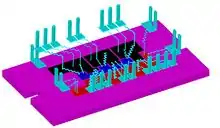InCa3D is a simulation tool dedicated to electrical connection modelling for both:
The software employs finite element analysis based on the PEEC Partial element equivalent circuit method [3] which proved to be efficient to solve Maxwell's equations in low and middle frequency, thanks to its ability to convert interconnections geometry into equivalent RLC circuit,[4] thus avoiding polygonal meshing of the air around the device.
InCa3D is developed in France (in collaboration with G2ELab) and distributed by Altair Engineering Inc.[5]

Power module modelisation with InCa3D

Magnetic field computation on distribution bars with InCa3D
Main application fields
InCa3D is well suited for modelling the behaviour of various connectors,
- from ICs, small wire bonds and PCBs tracks,
- up to bus bars, power modules and large distribution switchboards.
References
- ↑ EMC Modeling of an Industrial Variable Speed Drive With an Adapted PEEC Method IEEE Magnetics Society, Aug. 2010]
- ↑ EMC analysis of static converters by the extraction of a complete equivalent circuit via a dedicated PEEC method 8th International Symposium on Electric and Magnetic Fields, Mondovi : Italy (2009)]
- ↑ A. E. Ruehli: Equivalent Circuit Models for Three-Dimensional Multiconductor Systems, IEEE Transactions on Microwave Theory and Techniques, Vol. 22 (1974), Nr. 3
- ↑ MoM and PEEC Method to Reach a Complete Equivalent Circuit of a Static Converter 2009 20th International Zurich Symposium, Jan. 2009]
- ↑ MoM and PEEC Method to Reach a Complete Equivalent Circuit of a Static Converter, 2009 20th International Zurich Symposium, Jan. 2009
Other links
Partial element equivalent circuit method
Busbar Design: How to Spare Nanohenries ?
External links
This article is issued from Wikipedia. The text is licensed under Creative Commons - Attribution - Sharealike. Additional terms may apply for the media files.